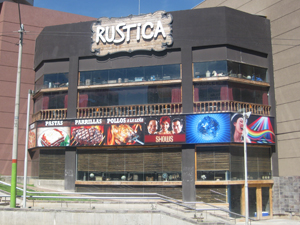Sometimes I forget that I don’t even need to travel outside of my own city to experience language barriers and misunderstandings. What’s beautiful is to be reminded that there’s more to communication than language.
I’m sitting at the bus stop when an old, petite lady sets her bags down on the bench with me. She stays standing. I’m in a good mood and strike up a conversation.
“That will be heavy to carry home.”
“No,” she says shaking her head as if it’s no big deal. She says a few more words – some incomprehensible – but I get the picture that she doesn’t have far to walk. I’m a little surprised that I can’t understand her because she looks European, if not Canadian. I figure I just didn’t hear properly.
“How many blocks do you have to walk?”
“One and a half.”
There is some silence and the conversation seems over.
“You’re Filipino?” she suddenly says. Now, this is surprising. No one ever guesses I have even the slightest Filipino blood – Chinese probably, Korean or Japanese maybe, but never Filipino, never without having seen my last name, and never in Vancouver – a city that boasts(?) the largest proportion of Chinese in Canada.
“Yes! How did you know?” I ask.
She begins to regale me with a story that I continue to not understand. I know she’s speaking English because some words come out loud and clear and she nods firmly after every few sentences, her body language exuding confidence as if I should be following everything she says. I’m trying hard to.
“Five days.”
“Millionaire.”
“Filipino.”
I’m nodding and saying, “Yeah,” intermittently as I collect clues on what she’s talking about. It’s as if we’re actually having a conversation. She convinces me that we are with the way she’s speaking to me – no hesitation, no pauses, no doubts, no verification questions (“Right?” “You know?”) I try to change the subject because I finally realize that she’s talking in circles…I think.
“What language do you speak?” I ask.
“Yes!” she says confidently with a sharp downward turn of the head. I almost forget what question I had and nod in agreement with her.
I try again.
“You speak another language?”
“I speak English.”
I try other ways of asking the question.
“I am Greek.” Oh, that explains it – or does it? I continue to be naïve about the stereotypes of different countries and cultures. I consider my naivete one of my greatest strengths.
The lady is eating an ice cream bar with a purpose.
“Greek-Canadian,” she confirms.
The bus is coming so we both get up and I offer to help her with her bags. There are a lot of senior citizens in my neighbourhood and I often help old ladies carry their bags home. This lady politely refuses with a smile and says “Salamat” – another clue to add to my inventory: maybe this Filipina lady in her life had some sort of influence. Despite her small stature, she assuredly bypasses the line up of people to get on the bus first and secure herself a good seat by the door.
At my stop, I’m conscious to see if she’s getting up as well. It seems like she is, but is she waiting for me to get up first? We have a bit of a miscommunication so I never really get a chance to say goodbye as she gets up. I thank the bus driver and when I walk off the bus, I turn my head slightly to catch a glimpse of whether she got off or not. She seems to be talking to the bus driver, as if convincing him to let her off the next block over. I wonder she is able to get her point across in the same “English” she used with me earlier.
At the end of my block, I turn the corner and look back. She’s walking behind me. The bus driver must have denied her request. I give a hearty wave and she communicates a goodbye with a firm nod my way. I think I see a hint of a smile.




